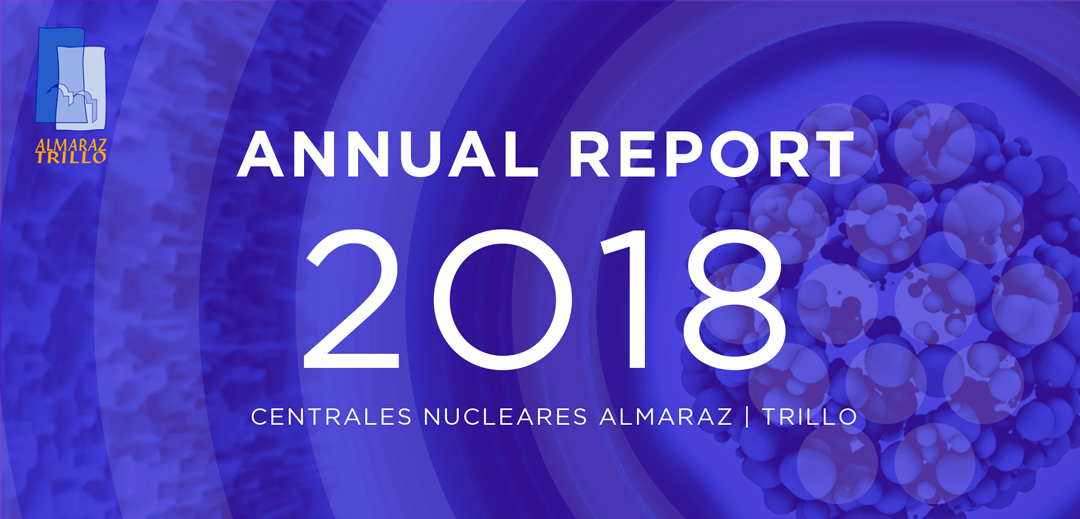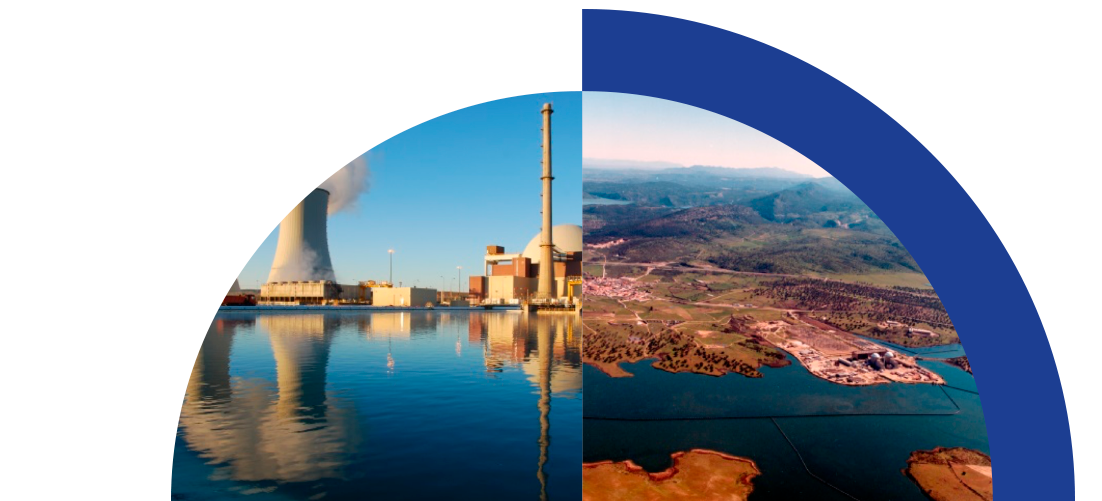

ENVIRONMENTAL QUALITY MANAGEMENT
AIE.’s commitment to respect the Environment at Almaraz-Trillo NPPs is expressed in the organisation’s Environmental Policy. The Environmental Policy drives application of the Environmental Management System and its continuous improvement, reflecting the Board’s commitment and constituting the founding principles on which the annual objectives programme is based, and in more general terms, the activities of the company in relation to the Environment..
ENVIRONMENTAL POLICY
CNAT’s environmental policy has been defined based on the purpose and context of the organisation, including the nature, magnitude and environmental impacts of its activities, products and services, constituting the reference framework for the Environmental Management System and upon which environmental objectives are established and reviewed. It guarantees the following commitments:
• To fully integrate the environmental dimension in the organisation’s strategy, to ensure protection of the environment, the natural environment and pollution prevention
• To continually improve all processes which could have environmental repercussions.
• To be aware of and evaluate the opportunities and environmental risks in relation to activities performed, to ensure achievement of expected results.
• To comply with the environmental legislation in force and other voluntarily accepted requirements, whilst maintaining an attitude of ongoing adherence
• To incorporate environmental management in all activities and levels of the organisation, including design, supply, operations and maintenance; identifying, preventing, controlling and minimising as far as possible, resulting environmental impacts:
• TO EMPLOY raw materials and energy rationally and minimise the generation of conventional and nuclear waste and effluents.
• TO AVOID inadequate waste collection and disposal of effluents, and the use of unauthorised sites.
• TO TAKE INTO ACCOUNT the development of new technologies to improve the efficiency of the nuclear generation of electrical power, and to research environmental issues and the development of energy savings.
• To motivate and train staff to respect the environment, stimulating development of an environmental culture and communicating the Environmental Policy within and outside the Organisation.
• To report environmental actions and results in a transparent manner, maintaining the appropriate channels to encourage communication with interest groups.
• To introduce and maintain updated a standard Environmental Management System.
ACTION PLANS
Almaraz-Trillo Nuclear Plants have continued to take extensive actions in relation to environmental issues during 2018, which are incorporated in the Environmental Management Programme, the most significant of which are detailed below:
• Reduction in the production of radioactive waste: optimisation of the design to minimise leakage of chemical products with impact on the generation of radioactive waste, and material declassification methodologies. There are also ongoing actions to reduce high activity radioactive waste, through a new approach to cycle management at Trillo NPP and a reduction in the volume of special waste (assembly heads) placed in the spent fuel pool at Almaraz NPP for subsequent management as RBMA.
• Legionella control in cooling towers has been enhanced through the study and testing of new treatments.
• Modifications to chillers with a view to completely eliminating the use of fluorinated gases impacting the ozone layer.
• Control of environmental impacts in the aquatic environment: implementation of a digital measurement system in the Essentials reservoir.
• Improvements to supervision of discharge conditions: installation of digital temperature recorders, adaptation of discharge parameter equipment alarms, etc.
• Minimisation of the generation of hazardous waste linked to the reduction of the risk of spillages of chemical products: minimisation of leaks and system improvements, work on discharge lines, improvements to FP system Diesel storage tanks, etc.
• Awareness campaigns to improve the segregation of hazardous and non-hazardous waste.
• Actions to reduce paper and toner consumption throughout the organisation.
• Improvements to the management of environmental incidents and their communication to Senior Management.
With regard to high level waste constituted by spent fuel extracted from the reactor, in 2018 the Independent Spent Fuel Storage Installation (ISFSI) started operations at Almaraz NPP.
ENVIRONMENTAL AUDITS
The Environmental Management System at Centrales Nucleares Almaraz–Trillo AIE has been certified by AENOR since 2005, in accordance with the international standard UNE-EN-ISO-14001. Between 24 and 28 September 2018, an Environmental Management System Monitoring Audit was performed by AENOR INTERNACIONAL SAU. The auditors reviewed the Almaraz and Trillo plants and the activities carried out at the Plant’s Offices, declaring the final outcome, “compliant”, without discovering any non-compliances.
The Environmental Management Certificate, after thirteen years of validity, was most recently renewed in 2017, the year in which it was adapted to the updated version of UNE-EN-ISO-14001: 2015, the standard in force until 28/11/2020, recognising the involvement of Management and the collective effort of the entire Organisation over these years. Each milestone of this nature must be understood, however, as a new starting point towards an improved environmental performance by the company.
Previously, in April, there was an internal audit of the System, an obligatory part of the verification process. There were several inspections by the Nuclear Safety Council on subjects related to the environment at both plants.

ENVIRONMENTAL MONITORING PROGRAMMES
Almaraz and Trillo Plants have historically run several environmental monitoring programmes, with the aim of verifying the absence of significant environmental impacts as a consequence of their activities, whether of a radiological or conventional type.
AQUATIC ECOSYSTEMS STUDY
Basically, two environmental studies are carried out in the surroundings of Almaraz NPP, which includes the Arrocampo and Torrejón reservoirs: an ecological study of the aquatic ecosystem and a thermal study of the reservoirs.
These surveillance studies are far-reaching because the Arrocampo must also be considered as another Plant system, as it was built exclusively for industrial use cooling Almaraz NPP and is used for final heat dissipation and therefore it is necessary to have as accurate as possible knowledge of its characteristics in terms of its ability to perform its cooling function, in both the short and long/term. This requires intensive monitoring and surveillance of both physical and chemical parameters, especially temperature, as well as biological factors.
The environmental study which is carried out in the vicinity of the Trillo plant consists currently of monitoring the river Tajo, where the thermal surplus discharge is made, and the Entrepeñas reservoir, located downstream in the proximity of the Plant.
This study included evaluating the water quality from the physico-chemical viewpoint, and its content of metals and other undesirable substances, as well as the characteristics of other elements of the aquatic ecosystem such as sediments, benthic algae, phyto and zoo plankton and ichthyofauna.
ENVIRONMENTAL RADIOLOGICAL MONITORING
The Almaraz and Trillo Plants exercise continuous strict control and monitoring of their own radioactive effluent emissions. Nonetheless, with the objective of verifying experimentally the impact radioactive elements might have on the environment, the plants have implemented an Environmental Radiological Monitoring Programme (ERMP) through direct measurement of radiation levels in the surroundings near to the installations, and of the content of radioactive substances from a series of types of environmental samples which are collected from a set of sampling points.
Comprehensive monitoring is carried out on all abiotic elements and living organisms represented in the ecosystems associated with all the natural resources of the surroundings of the plants (air, land and water).
Both Plants collect a large number of samples annually for different types of analysis (gamma spectrometry, beta activity, environmental dose, strontium, tritium and radioiodines).
The usefulness of the analytical results is assured through parallel implementation of a quality control programme by another, independent laboratory, and by implementing a programme of independent monitoring (PVRAIN) directly by the Nuclear Safety Council.
Also, the Almaraz Plan maintains a collaboration agreement with CEDEX to enable this official body, reporting to the Ministry of Development, to carry out independent surveillance of the aquatic resources in the proximity of the Plant. Extremadura Council also carries out independent radiological monitoring, with the help of the University of Extremadura.
Results obtained during 2018 at both plants indicate that the radiological state of the ecosystems of their surroundings have experienced no significant variations during the year, with natural background values remaining unchanged, confirming the absence of environmental effects due to the leakage of radioactive elements, rendering radiologically insignificant any leakages from both plants.
METEOROLOGICAL STUDIES
Almaraz and Trillo plants employ meteorological stations which are used continuously to measure and record the most significant parameters such as temperature, precipitation, wind direction and speed, humidity and solar radiation. The meteorological information is of particular relevance for various applications related to the environment, providing an excellent description of the climate at the site, after thirty years of monitoring.
The stations provide the required redundancy to ensure continuous availability of meteorological information.




